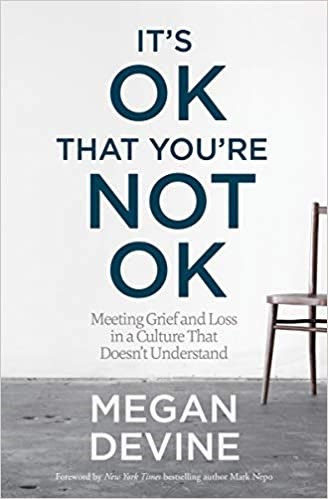SFCS Holds Virtual Book Talk for It’s OK That You’re Not OK, in Light of the COVID-19 Pandemic
- Tuesday, 14 July 2020 16:01
- Last Updated: Wednesday, 15 July 2020 14:52
- Published: Tuesday, 14 July 2020 16:01
- Hits: 2137
 Everything is not okay, and according to author Meghan Divine, it’s important to acknowledge upheavals, losses and grief.
Everything is not okay, and according to author Meghan Divine, it’s important to acknowledge upheavals, losses and grief.
On July 9, 2020, Judi Townsend, James Genovaand Lauren Pomerantz from the Scarsdale Safe Coalition and Scarsdale Edgemont Family Counseling Service held a discussion via Zoom about Meghan Divine’s book "It’s OK That You’re Not OK." Eighteen people, including the hosts, were present at the meeting. The general tenor was relaxed yet somber, as people let their guards down and openly revealed the struggles they are facing due to the pandemic. The conversation revolved around coping with loss, specifically ambiguous losses related to the COVID-19 pandemic. Although reading the book was not required for attending the discussion, many participants applied their knowledge from it when sharing their thoughts.
The discussion was split into three sections. The first involved recognizing the difference between the grief experienced from the loss of a loved one, and that from the ambiguous losses of the pandemic. Participants compiled a list of pandemic-related ambiguous losses, which included loss of structure and routine, missing out on important events, and the loss of a sense of safety. The professionals from SFCS stressed that people are not used to dealing with ambiguous losses like these. One of the participants, who will remain anonymous, noted that she constantly reminds her kids “I have never done a pandemic before. I might mess up a couple of times.”
The group realized that this is the first moment within their lifetimes that everyone is experiencing together, unlike past historical events such as 9/11, which affected people to different extents. The participants felt that everyone should acknowledge that these are tough times and it’s okay that every day isn’t going to be enjoyable and smooth. They agreed that people are now open to the idea of acknowledging the negative aspects of their daily life, and conversations feel more heartfelt and honest than ever before.
The group also discussed the silver linings of the pandemic, such as having time to focus on a new hobby, or having virtual get-togethers that may not have been possible in-person. Although Meghan Drive writes that there are no such things as silver linings, arguing that they invalidate someone’s suffering, the participants felt otherwise.
The next segment of the discussion focused on the way our culture deals with grief, viewing it in a critical manner. Many participants described the helpless feeling of watching their friends and loved ones grieve and being unable to fully help them or understand their pain. They felt they were never taught how to handle difficult situations, and how to properly help their close friends and family when they are grieving. Since grieving itself is often stigmatized, and mourners are expected to remain composed, they end up recovering from the distress of grief, but not the grief itself. In terms of the pandemic, participants agreed that it is harder to deal with the grief of the pandemic when the community is divided. When there is controversy, this time feels much more dire.
The end of the conversation connected back to the book. The professionals moderating the discussion posed the following question: “Does the book give permission to grieve loss and come out from it as a different person?” The participants agreed it is often difficult to get full closure from a loss, and due to the uncertainty of the current times, people are experiencing anxiety from the possibility of future losses.
The discussion lasted a full hour, and the professionals from the Scarsdale Safe Coalition and Scarsdale Edgemont Family Counseling Service successfully moderated an engaging conversation. Participants surely left with more insight on the pandemic than they had before they attended. They felt that Meghan Divine’s It’s OK That You’re Not OK feels more relavent right now, and that the discussion was an important reminder that it’s normal to feel anxious and frustrated during these uncertain times. The group consensus was that it is important to accept other’s concerns and apprehensions in order to be united as a community.






